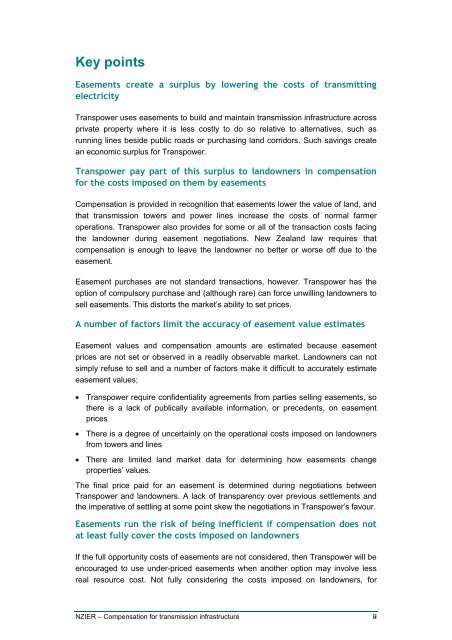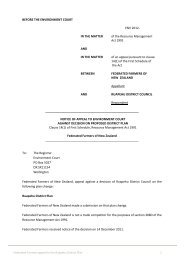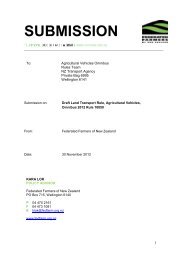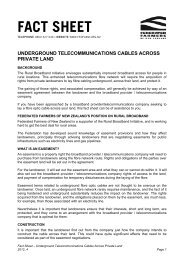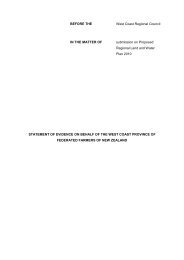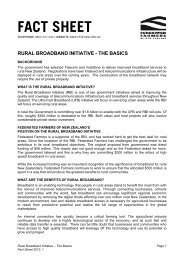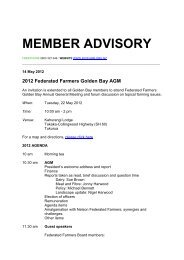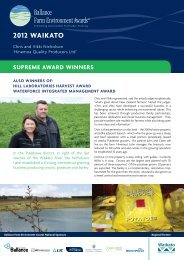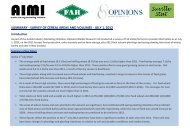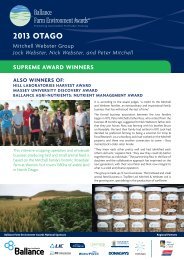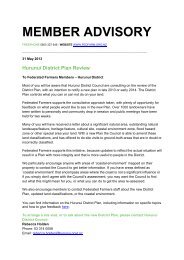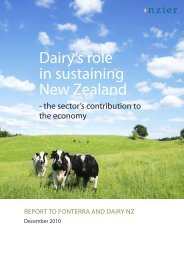NZIER report on compensation for transmission infrastructure
NZIER report on compensation for transmission infrastructure
NZIER report on compensation for transmission infrastructure
Create successful ePaper yourself
Turn your PDF publications into a flip-book with our unique Google optimized e-Paper software.
Key points<br />
Easements create a surplus by lowering the costs of transmitting<br />
electricity<br />
Transpower uses easements to build and maintain transmissi<strong>on</strong> <strong>infrastructure</strong> across<br />
private property where it is less costly to do so relative to alternatives, such as<br />
running lines beside public roads or purchasing land corridors. Such savings create<br />
an ec<strong>on</strong>omic surplus <strong>for</strong> Transpower.<br />
Transpower pay part of this surplus to landowners in compensati<strong>on</strong><br />
<strong>for</strong> the costs imposed <strong>on</strong> them by easements<br />
Compensati<strong>on</strong> is provided in recogniti<strong>on</strong> that easements lower the value of land, and<br />
that transmissi<strong>on</strong> towers and power lines increase the costs of normal farmer<br />
operati<strong>on</strong>s. Transpower also provides <strong>for</strong> some or all of the transacti<strong>on</strong> costs facing<br />
the landowner during easement negotiati<strong>on</strong>s. New Zealand law requires that<br />
compensati<strong>on</strong> is enough to leave the landowner no better or worse off due to the<br />
easement.<br />
Easement purchases are not standard transacti<strong>on</strong>s, however. Transpower has the<br />
opti<strong>on</strong> of compulsory purchase and (although rare) can <strong>for</strong>ce unwilling landowners to<br />
sell easements. This distorts the market‟s ability to set prices.<br />
A number of factors limit the accuracy of easement value estimates<br />
Easement values and compensati<strong>on</strong> amounts are estimated because easement<br />
prices are not set or observed in a readily observable market. Landowners can not<br />
simply refuse to sell and a number of factors make it difficult to accurately estimate<br />
easement values;<br />
Transpower require c<strong>on</strong>fidentiality agreements from parties selling easements, so<br />
there is a lack of publically available in<strong>for</strong>mati<strong>on</strong>, or precedents, <strong>on</strong> easement<br />
prices<br />
There is a degree of uncertainly <strong>on</strong> the operati<strong>on</strong>al costs imposed <strong>on</strong> landowners<br />
from towers and lines<br />
There are limited land market data <strong>for</strong> determining how easements change<br />
properties‟ values.<br />
The final price paid <strong>for</strong> an easement is determined during negotiati<strong>on</strong>s between<br />
Transpower and landowners. A lack of transparency over previous settlements and<br />
the imperative of settling at some point skew the negotiati<strong>on</strong>s in Transpower‟s favour.<br />
Easements run the risk of being inefficient if compensati<strong>on</strong> does not<br />
at least fully cover the costs imposed <strong>on</strong> landowners<br />
If the full opportunity costs of easements are not c<strong>on</strong>sidered, then Transpower will be<br />
encouraged to use under-priced easements when another opti<strong>on</strong> may involve less<br />
real resource cost. Not fully c<strong>on</strong>sidering the costs imposed <strong>on</strong> landowners, <strong>for</strong><br />
<str<strong>on</strong>g>NZIER</str<strong>on</strong>g> – Compensati<strong>on</strong> <strong>for</strong> transmissi<strong>on</strong> <strong>infrastructure</strong> ii


